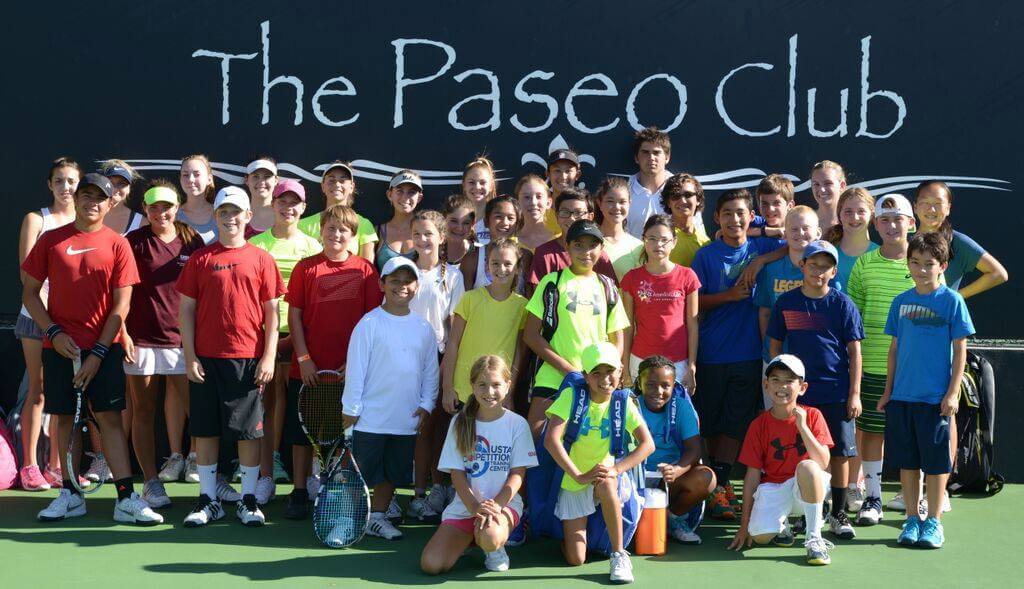What is the junior tennis program at the Paseo Club?
October 24th, 2022 | 5 min. read
By Jen Azevedo

Junior tennis at the Paseo Club is a program for youth tennis players ages 3-18.
The mission of the junior tennis program is to provide a platform that enables young students to become confident players through effort, accountability, and discipline — without losing sight of having fun!
Paseo Club began as a tennis club in 2003 and has expanded to include pickleball, workout facilities, and a junior-Olympic pool. We offer several youth programs to help kids be fit, healthy, and connected with peers and instructors.
In this article, we will tell you everything you need to know about our junior tennis program — who it is for, the philosophy behind the program, the benefits of tennis for kids, and so much more.
What are the benefits of tennis for kids?
Tennis offers benefits that are applicable to everyday life. In fact, it is a wonderful metaphor for life.
Kids learn that hard work will always be rewarded — you will literally get out of it what you put into it. Nothing is handed to you, and that one has to earn it.
Tennis is also great for making friends and building camaraderie while fostering a positive competitive spirit.
It also provides a great outlet in this fast-moving world, where finding a balance between academic stress and the pressures of social media is not always easy.
What is the pyramid system in junior tennis?
At junior tennis, there is an opportunity for players of any age or level to play on the courts.
All the different ages and playing levels represent within a pyramid structure, with the youngest players at the base and our most advanced players at the peak.
- Paseo Preschoolers is a group for ages 3-5. These shorter classes teach agility, balance, and coordination - the ABCs of early athletics.
- Paseo Futures is for ages 5-8 and focuses on technique fundamentals and footwork.
- Paseo Challengers is for ages 10 and older who are brand new to the sport. It is never too late to learn tennis. There have been kids ages 13-14-years-old who have never picked up a racket, and within a year, they're knocking on the Varsity door.
- Tournament Training is for 13-18-year-olds. Kids start to work on rally tolerance, developing a "weapon" shot, and early aspects of strategy, such as setting up a point and playing to your strengths while exploiting opponents' weaknesses.
- High Performance is for teens who are preparing for college tennis. The stroke variations must be sound, and match play strategy becomes a much larger component. Participation is based on pre-approval.
On the highest level, all the players can hit. It becomes about having a game plan and executing it, anticipating your opponents' shots, and planning a counter-offense while amid a defensive battle. It's chess with a racket.
Can youth play competitively through junior tennis?
We are fortunate to have some of the best players in the San Fernando Valley. We help facilitate UTR (Rating by Universal Tennis) matches/tournaments and other competitive formats.
We are also beginning to host USTA junior tournaments again.
There is a members only juniors ladder at Paseo. Juniors who participate have the chance to continually work on their ladder position by challenging players above them, and earning points toward their rankings.
Do kids graduate from the junior program to play college-level tennis?
Several former junior players have already graduated high school and are currently playing at the collegiate level.
Recently a Division I school back East recruited one of our girls. She is currently competing for a regular lineup spot in the upcoming season.
Can kids play recreationally — for fitness and fun?
Absolutely.
Juniors can play in the junior ladder league until they are 18. Afterward, they would play in adult leagues such as the singles flex league.
Why is embracing hard work important for young people, and how does it prepare kids for the real world?
Many kids are not familiar with what hard work is. It's not taught in most schools anymore. A work ethic can be learned.
At junior tennis, we like to demonstrate the value of hard work. It builds character for life because hard work doesn't stop on the tennis court.
It is infinitely more important to be a responsible human being, than to be a good tennis player. There is no reason why you can't be both.
In junior tennis, you encourage kids to “play up.” Why is that?
As an athlete, you're always looking to challenge yourself. To grow as a player it is downright necessary to play against better players to raise your own skill level.
Sometimes you simply need to learn from another player what can be achieved to build your confidence. “If someone else has attained this level of skill, why shouldn't I be able to do it?”
We really encourage playing up in general, not just for our juniors.
What is the difference between potential and talent?
Talent is the natural ability to play tennis. Talent is what the player already brings with them.
Potential refers to the possibility of performing at an even higher level, but the ability is not yet refined. Therefore, potential requires coaching and development since it is a long process and can be accomplished in the future.
You could argue the more talented a player is, the more potential they have. However, no player will ever reach the next level without hard work. That is what lies essentially at the root of it all.
Without hard work, you will not improve, let alone fulfill your potential.
A player with less talent can achieve more in the long run because they have maximized their potential through hard work.
Every player matures at their own pace. Therefore, it is crucial not to draw early conclusions about their potential and to keep guiding their development. Everybody discovers their own path.
How do you work with a group so that not everyone is standing around while you work with just one kid?
Tennis is a running sport and should be taught as such from the onset. The emphasis on footwork is taught very early on. "ABB" — always be bouncing — is the motto. Fun and engaging footwork drills are a great way to keep things moving.
How many coaches are a part of the junior program, and what is your coach-to-student ratio?
There are currently nine coaches involved in the junior program. There is typically one instructor for every six students, and we cap the number at eight.
Recently there has been a lot of concern about athletes’ mental health and burnout. How does the Paseo youth program address this?
We customize the needs of each individual. When a child or teen competes, there is increased pressure and responsibility. We assess how it affects the youth by looking at different factors.
• How the child handles competition and challenging match situations
• Assess tournament performances properly and take breaks when needed
• Do not push beyond the capacity of each child
• Offer preventative support
The child needs commitment and passion to succeed, and if it is not there, then there is no use in forcing the child to participate.
Final steps to learning about the junior tennis program at the Paseo Club
The Paseo Club has professional-level tennis coaches who are committed to nurturing children of all ages and skill levels in the sport of tennis.
The emphasis of the program is to inspire children to develop their work ethic, tennis skills, and love of the game. We foster a sense of community and mutual support and encouragement.
Getting your kid involved in junior tennis or other physical activities is important not only for their physical health, but also for mental health, and academic standing.
Junior tennis is just one program available to kids at the Paseo Club. The Paseo Club also has other youth programs.
- Swim lessons
- Martial arts
- Kid’s fitness
- Pickleball
See the courts and the rest of the 8-acre club by scheduling a tour today.
To learn more in-depth information about why being active is important for kids, the Paseo youth programs, or how you and your children can unwind after a long day, check out these articles below.
- The 10 benefits of getting your child active
- Top activities for kids at the Paseo Club
- The 8 best relaxation techniques
Jen Azevedo is a tennis professional, pickleball professional, personal trainer, group exercise instructor, and the general manager of the Paseo Club. She loves the community at the Paseo Club and that it is also a safe and fun place for her daughter. Jen’s favorite activities are joining her tribe for trail races or her partners for tennis matches. Occasionally Jen slows down to relax with a book — she reads over 100 a year!
Topics:

